Christopher Allen's Blog
January 7, 2019
Other Household Toxins is Half Price This Month!
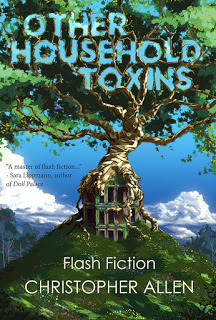 Hi, everyone!
Hi, everyone!My baby is one year old this month, so we're celebrating. My publisher, Matter Press, is offering the collection for $5 + shipping in January when you buy directly from the Matter Press site. Just click HERE to buy my Baby.
If you've already bought my Baby (and you've read him), how about leaving an Amazon or Goodreads review this month? Like a birthday present? Leaving an Amazon or Goodreads review increases your adorableness by 84%.
I hope your year is starting well.
I must be off,
Christopher
_________________________
Christopher Allen is the author of Other Household Toxins (Matter Press) and Conversations with S. Teri O'Type (a Satire) . Allen's fiction has appeared, or is forthcoming, in [PANK], Eclectica Magazine's 20th-Anniversary Speculative anthology, Indiana Review, Split Lip Magazine, SmokeLong Quarterly: the Best of the First Ten Years anthology, Longleaf Review and Lunch Ticket, among many others great places. Read his book reviews inNecessary Fiction, Word Riot, and The Lit Pub. His creative non-fiction has been featured in Bootsnall Travel, Chicken Soup for the Soul and others. A finalist at Glimmer Train in 2011, Allen is a multiple nominee for the Pushcart Prize, Best of the Net, The Best Small Fictions, storySouth's Million Writers Award and others. In 2017 Allen was both a finalist (as translator) and semifinalist for The Best Small Fictions. He is presently the co-editor of SmokeLong Quarterly and a consulting editor for The Best Small Fictions 2018. Share Email Post
Published on January 07, 2019 05:57
October 31, 2018
Readers' Choice Award 2018
 We have a clear winner! With over 1000 views, Brittany Rohm's "Beyond the Reef" is the winner of the Readers' Choice Award in the 2018 I Must Be Off! Travel Writing competition. This means we'll be sending Britanny €50 in the next few minutes. Congratulations to everyone who made the long- and shortlists in the competition and of course to those few who won some money. Thank you to everyone who participated and shared your adventures.
We have a clear winner! With over 1000 views, Brittany Rohm's "Beyond the Reef" is the winner of the Readers' Choice Award in the 2018 I Must Be Off! Travel Writing competition. This means we'll be sending Britanny €50 in the next few minutes. Congratulations to everyone who made the long- and shortlists in the competition and of course to those few who won some money. Thank you to everyone who participated and shared your adventures.In 2019, I Must Be Off! will be renovating, so watch this space for great things. And of course we'll be holding the I Must Be Off! Travel Writing competition again. In the meantime, go somewhere exciting. That place might be just around the corner from your home or the farthest corner of the earth. Wherever it is, make it an adventure.
I must be off,
Christopher
PS: In case you haven't heard me shouting in from the rooftops, my debut collection of flash fiction, Other Household Toxins, was published in January (Matter Press). You can order it from Amazon if you're adorable and you live in the United States.
_________________________
 Christopher Allen is the author of
Other Household Toxins
(Matter Press) and
Conversations with S. Teri O'Type (a Satire)
. Allen's fiction has appeared, or is forthcoming, in [PANK], Eclectica Magazine's 20th-Anniversary Speculative anthology, Indiana Review, Split Lip Magazine, SmokeLong Quarterly: the Best of the First Ten Years anthology,
Longleaf Review
and Lunch Ticket, among many others great places. Read his book reviews inNecessary Fiction, Word Riot, and The Lit Pub. His creative non-fiction has been featured in Bootsnall Travel, Chicken Soup for the Soul and others. A finalist at Glimmer Train in 2011, Allen is a multiple nominee for the Pushcart Prize, Best of the Net, The Best Small Fictions, storySouth's Million Writers Award and others. In 2017 Allen was both a finalist (as translator) and semifinalist for The Best Small Fictions. He is presently the co-editor of SmokeLong Quarterly and a consulting editor for The Best Small Fictions 2018.
Christopher Allen is the author of
Other Household Toxins
(Matter Press) and
Conversations with S. Teri O'Type (a Satire)
. Allen's fiction has appeared, or is forthcoming, in [PANK], Eclectica Magazine's 20th-Anniversary Speculative anthology, Indiana Review, Split Lip Magazine, SmokeLong Quarterly: the Best of the First Ten Years anthology,
Longleaf Review
and Lunch Ticket, among many others great places. Read his book reviews inNecessary Fiction, Word Riot, and The Lit Pub. His creative non-fiction has been featured in Bootsnall Travel, Chicken Soup for the Soul and others. A finalist at Glimmer Train in 2011, Allen is a multiple nominee for the Pushcart Prize, Best of the Net, The Best Small Fictions, storySouth's Million Writers Award and others. In 2017 Allen was both a finalist (as translator) and semifinalist for The Best Small Fictions. He is presently the co-editor of SmokeLong Quarterly and a consulting editor for The Best Small Fictions 2018.
Published on October 31, 2018 09:07
October 14, 2018
New Story at Longleaf Review
Thank you so much to the editors of Longleaf Review for believing in my story, "Blood Brother." The blood-red lake they've chosen as the background art is perfect. Check out the 28 other pieces in the issue.
There's so much going on in this brief piece of fiction. With 911 right there in the middle of it, it appears more and more to me that I am again telling a story about an irreparable rip in a character's life. But then there's also the pervy Scoutmaster, whom you're free to speculate about all you want.
Thank you for the reads!
Blood Brother
I must be off,
Christopher__________________________________
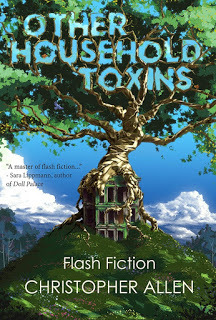 Christopher Allen is the author of
Other Household Toxins
(Matter Press) and
Conversations with S. Teri O'Type (a Satire)
. Allen's fiction has appeared, or is forthcoming, in [PANK], Eclectica Magazine's 20th-Anniversary Speculative anthology, Indiana Review, Split Lip Magazine, SmokeLong Quarterly: the Best of the First Ten Years anthology,
Longleaf Review
and Lunch Ticket, among many others great places. Read his book reviews inNecessary Fiction, Word Riot, and The Lit Pub. His creative non-fiction has been featured in Bootsnall Travel, Chicken Soup for the Soul and others. A finalist at Glimmer Train in 2011, Allen is a multiple nominee for the Pushcart Prize, Best of the Net, The Best Small Fictions, storySouth's Million Writers Award and others. In 2017 Allen was both a finalist (as translator) and semifinalist for The Best Small Fictions. He is presently the co-editor of SmokeLong Quarterly and a consulting editor for The Best Small Fictions 2018.
Christopher Allen is the author of
Other Household Toxins
(Matter Press) and
Conversations with S. Teri O'Type (a Satire)
. Allen's fiction has appeared, or is forthcoming, in [PANK], Eclectica Magazine's 20th-Anniversary Speculative anthology, Indiana Review, Split Lip Magazine, SmokeLong Quarterly: the Best of the First Ten Years anthology,
Longleaf Review
and Lunch Ticket, among many others great places. Read his book reviews inNecessary Fiction, Word Riot, and The Lit Pub. His creative non-fiction has been featured in Bootsnall Travel, Chicken Soup for the Soul and others. A finalist at Glimmer Train in 2011, Allen is a multiple nominee for the Pushcart Prize, Best of the Net, The Best Small Fictions, storySouth's Million Writers Award and others. In 2017 Allen was both a finalist (as translator) and semifinalist for The Best Small Fictions. He is presently the co-editor of SmokeLong Quarterly and a consulting editor for The Best Small Fictions 2018.
There's so much going on in this brief piece of fiction. With 911 right there in the middle of it, it appears more and more to me that I am again telling a story about an irreparable rip in a character's life. But then there's also the pervy Scoutmaster, whom you're free to speculate about all you want.
Thank you for the reads!
Blood Brother
I must be off,
Christopher__________________________________
 Christopher Allen is the author of
Other Household Toxins
(Matter Press) and
Conversations with S. Teri O'Type (a Satire)
. Allen's fiction has appeared, or is forthcoming, in [PANK], Eclectica Magazine's 20th-Anniversary Speculative anthology, Indiana Review, Split Lip Magazine, SmokeLong Quarterly: the Best of the First Ten Years anthology,
Longleaf Review
and Lunch Ticket, among many others great places. Read his book reviews inNecessary Fiction, Word Riot, and The Lit Pub. His creative non-fiction has been featured in Bootsnall Travel, Chicken Soup for the Soul and others. A finalist at Glimmer Train in 2011, Allen is a multiple nominee for the Pushcart Prize, Best of the Net, The Best Small Fictions, storySouth's Million Writers Award and others. In 2017 Allen was both a finalist (as translator) and semifinalist for The Best Small Fictions. He is presently the co-editor of SmokeLong Quarterly and a consulting editor for The Best Small Fictions 2018.
Christopher Allen is the author of
Other Household Toxins
(Matter Press) and
Conversations with S. Teri O'Type (a Satire)
. Allen's fiction has appeared, or is forthcoming, in [PANK], Eclectica Magazine's 20th-Anniversary Speculative anthology, Indiana Review, Split Lip Magazine, SmokeLong Quarterly: the Best of the First Ten Years anthology,
Longleaf Review
and Lunch Ticket, among many others great places. Read his book reviews inNecessary Fiction, Word Riot, and The Lit Pub. His creative non-fiction has been featured in Bootsnall Travel, Chicken Soup for the Soul and others. A finalist at Glimmer Train in 2011, Allen is a multiple nominee for the Pushcart Prize, Best of the Net, The Best Small Fictions, storySouth's Million Writers Award and others. In 2017 Allen was both a finalist (as translator) and semifinalist for The Best Small Fictions. He is presently the co-editor of SmokeLong Quarterly and a consulting editor for The Best Small Fictions 2018.
Published on October 14, 2018 08:13
October 13, 2018
What People are Saying about Other Household Toxins
 Hey, adorable IMBO readers!
Hey, adorable IMBO readers!My flash fiction collection, Other Household Toxins, came out in January. I love all the stories in the collection. I love the cover art. I love the reviews people have been writing. And I hope you love it too. If you live in the US, you can buy it on Amazon. If you live in the UK or anywhere else in the world, you can send me an email (christopher@imustbeoff.com) and I'll set you up with a signed copy. But I dawdle.
This post is meant to serve as the Mother Ship for all the blog interviews and reviews related to Other Household Toxins . I'll be revising this post when new interviews and reviews come in.
Reviews:
John Riley reviews Other Household Toxins for Necessary Fiction .
Michael Czyzniejewski reviews the title story from Other Household Toxins on his story366 blog.
April Bradley writes a collage review of Other Household Toxins using only lines from the collection at Bending Genres.
Susan W. Kemp reviews/recommends Other Household Toxins at her blog.
Debbi Voisey's review of the collecction at My Way By Moonlight.
Interviews:
A Mini-Interview at tommydeanwriter about flash and craft.
Sophie van Llewyn interviews me over at Nik Perring's blog.
Debbi Voisey interviews me on My Way By Moonlight
Helen Rye interviews me at Gatehouse Press
I talk about Other Household Toxins, the UK Flash Fiction Festival in Bristol (July 20-22) and other things at the Flash Fiction Festival Blog.
Rupert Dastur interviews me at TSS Publishing.
More to come!
I must be off,
Christopher
___________________________________________
Christopher Allen is the author of Other Household Toxins (Matter Press) and Conversations with S. Teri O'Type (a Satire) . Allen's fiction has appeared, or is forthcoming, in [PANK], FRiGG, Eclectica Magazine's 20th-Anniversary Speculative anthology, Indiana Review, Night Train, Juked, SmokeLong Quarterly: the Best of the First Ten Years anthology, and Lunch Ticket, among many others. Read his book reviews in[PANK] blog, Necessary Fiction, Word Riot, and The Lit Pub. His creative non-fiction has been featured in Bootsnall Travel, Chicken Soup for the Soul and lots of other good places. A finalist at Glimmer Train in 2011, Allen is a multiple nominee for the Pushcart Prize, Best of the Net, The Best Small Fictions, storySouth's Million Writers Award and others. In 2017 Allen was both a finalist (as translator) and semifinalist for The Best Small Fictions. He is presently the managing editor of SmokeLong Quarterly and a consulting editor for The Best Small Fictions 2018.
Published on October 13, 2018 03:00
October 10, 2018
Cycling in Munich -- Tips from a Local
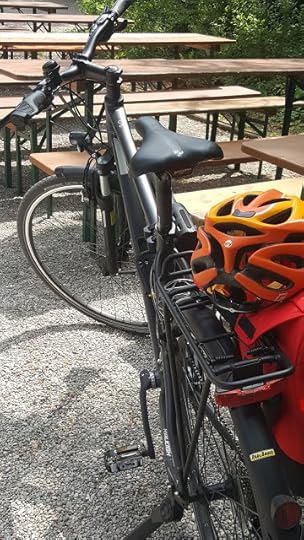 Bike and Biergarten -- Great CombinationI was not raised with a bicycle. Or maybe I had one for 10 minutes when I was 10--before it was stolen. Nashville, at least way back when I was a kid, was not a place for bikes. Munich, my home now, is. It's not Beijing, but it's certainly bike-friendly--or bike-aggressive maybe? Cycling in Munich is a way to get to work for many people, not merely something fun to do in their free time.
Bike and Biergarten -- Great CombinationI was not raised with a bicycle. Or maybe I had one for 10 minutes when I was 10--before it was stolen. Nashville, at least way back when I was a kid, was not a place for bikes. Munich, my home now, is. It's not Beijing, but it's certainly bike-friendly--or bike-aggressive maybe? Cycling in Munich is a way to get to work for many people, not merely something fun to do in their free time.The weekend after we bought bikes, Felix the Ballpoint Pen Licker's Assistant and I cycled 20k to the north, 20k to the south, along the Isar River, and then a few weekends ago along the Mangfall river. I have seen more of Munich and the surrounding countryside of Bavaria in the last two weekends than I have in the 23 years I've lived here. On a bike.
The last time you visited Munich, you probably had a hotel near the Wiesn--where Oktoberfest happens (in September; please don't forget this) so that you could weave and stumble back to it easily in the early morning hours. You probably lost your cellphone and your wallet, spent at least one evening in the ER, and met some very nice Aussie guy (whom you keep meaning to inform about his child but Australia is so far away and ya-de-ya). You could do Munich differently.
On a bike.
You can't have mine, but there are so many places to rent a bike in Munich. You're probably better at finding these places than I am, but here's a helpful link. Several companies have placed bikes around the city. You can rent these with your credit card, but these bikes aren't great. They lack gears, I think, and look kind of stupid; if you're like me, you have an aversion to looking stupid. With a bit more planning, you can look much cooler. The private bike rental shops have better bikes: bikes that are more appropriate for longer tours.
Cycling Apps
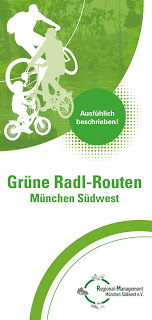 I have not downloaded these apps. I leave such things to Felix the Ballpoint Pen Licker's Assistant. My main task is being adorable; I have enough to do. I'm told, though, it takes only a couple minutes to download these things, and apparently they have been instrumental in guiding our bike tours around Munich and beyond. Apparently, with the MVV Cycle Route Planner you can filter for the quickest route or the greenest route. The green routes will take you through parks and forests, which is great if you're a bit apprehensive about cycling in traffic. The quickest route will take you along streets where the bikes lanes are excellent but often busy. If you have no experience cycling in European cities, I'd take the green routes.
I have not downloaded these apps. I leave such things to Felix the Ballpoint Pen Licker's Assistant. My main task is being adorable; I have enough to do. I'm told, though, it takes only a couple minutes to download these things, and apparently they have been instrumental in guiding our bike tours around Munich and beyond. Apparently, with the MVV Cycle Route Planner you can filter for the quickest route or the greenest route. The green routes will take you through parks and forests, which is great if you're a bit apprehensive about cycling in traffic. The quickest route will take you along streets where the bikes lanes are excellent but often busy. If you have no experience cycling in European cities, I'd take the green routes.If you are thinking about cycling outside Munich, here's a great APP for that. The well-kept bike paths in Bavaria and Austria will take you to breathtaking scenery and quaint little villages.
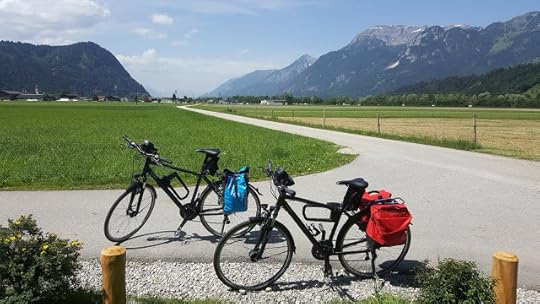 On our way to Innsbruck--OK, this is Austria.
On our way to Innsbruck--OK, this is Austria. Dangers
Do you have trams in your city? You may call them streetcars; you may be confused right now. Chances are if you're from the US, you know this mode of transport only from storybooks as a quaint, romantic--even magical--beast: a long hollow worm filled with people, crawling and rumbling through a city, eating and vomiting passengers from time to time. It's just wacky, I know. For many European cities, though, this is not a rare animal but rather an accepted and even vital part of a functioning city.
Problem is, trams run on tracks that are just deep and wide enough to snag a bicycle tire. If you drive into one, you'll flip your bike and break hopefully only a wrist. You could break your neck. Always drive over tram tracks at an angle to the track. Here's a lovely video that explains in detail the dangers of cycling in cities with trams in Scottish English! Beautiful and very helpful.
In cities with narrow streets lined with parked cars, there's always the danger of someone opening a door. You need to be 1.5 meters away from the cars to be on the safe side. So I was going to show you a video of a car door accident, but they're all too upsetting. If you're into that sort of thing, do your own YouTube search. Ouch. Munich's streets are sometimes a triple whammy: narrow streets, lined with parked cars, with tram tracks. If you are at all apprehensive about cycling in these conditions, just get off the bike and walk it to the next street where conditions are better.
Where to Cycle
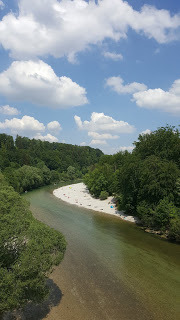
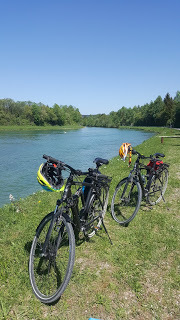 The Isar river provides an enjoyable, often shaded tour through some of the most beautiful nature Munich has to offer. Just be careful when you're near the city. The bike paths are very congested there, especially on the weekends. Cycle just a couple kilometers outside the city and you'll be surrounded by trees, nature--and sometimes naturists. There are also lots of restaurants and kiosks along the way.
The Isar river provides an enjoyable, often shaded tour through some of the most beautiful nature Munich has to offer. Just be careful when you're near the city. The bike paths are very congested there, especially on the weekends. Cycle just a couple kilometers outside the city and you'll be surrounded by trees, nature--and sometimes naturists. There are also lots of restaurants and kiosks along the way.The English Garden is one of Europe's best and largest city parks. Near the center of the city, the park is very crowded, but the more north you cycle the fewer people and more trees you'll see.
 The Eisbach at the English Garden is one of the city's most beautiful attractions.
The Eisbach at the English Garden is one of the city's most beautiful attractions.The next time you're in Munich, rent a bike. You'll see more, feel better. Yes, of course drink and sing until 2 a.m. Do that too.
Hey! I have a new book out! It's a collection of flash fiction, and it's available in the US on Amazon. It's called Other Household Toxins or Baby if you're adorable enough to buy it. Kathy Fish has said the collection "could well serve as a flash fiction primer," so if you're wondering what flash fiction is, buy my Baby!
I must be off,
Christopher
_______________________________________
 Christopher Allen is the author of
Other Household Toxins
(Matter Press) and
Conversations with S. Teri O'Type (a Satire)
. Allen's fiction has appeared, or is forthcoming, in [PANK], Eclectica Magazine's 20th-Anniversary Speculative anthology, Indiana Review, Split Lip Magazine, SmokeLong Quarterly: the Best of the First Ten Years anthology, Longleaf Review and Lunch Ticket, among many others great places. Read his book reviews inNecessary Fiction, Word Riot, and The Lit Pub. His creative non-fiction has been featured in Bootsnall Travel, Chicken Soup for the Soul and others. A finalist at Glimmer Train in 2011, Allen is a multiple nominee for the Pushcart Prize, Best of the Net, The Best Small Fictions, storySouth's Million Writers Award and others. In 2017 Allen was both a finalist (as translator) and semifinalist for The Best Small Fictions. He is presently the co-editor of SmokeLong Quarterly and a consulting editor for The Best Small Fictions 2018.
Christopher Allen is the author of
Other Household Toxins
(Matter Press) and
Conversations with S. Teri O'Type (a Satire)
. Allen's fiction has appeared, or is forthcoming, in [PANK], Eclectica Magazine's 20th-Anniversary Speculative anthology, Indiana Review, Split Lip Magazine, SmokeLong Quarterly: the Best of the First Ten Years anthology, Longleaf Review and Lunch Ticket, among many others great places. Read his book reviews inNecessary Fiction, Word Riot, and The Lit Pub. His creative non-fiction has been featured in Bootsnall Travel, Chicken Soup for the Soul and others. A finalist at Glimmer Train in 2011, Allen is a multiple nominee for the Pushcart Prize, Best of the Net, The Best Small Fictions, storySouth's Million Writers Award and others. In 2017 Allen was both a finalist (as translator) and semifinalist for The Best Small Fictions. He is presently the co-editor of SmokeLong Quarterly and a consulting editor for The Best Small Fictions 2018.
Published on October 10, 2018 09:45
October 8, 2018
2018 - JUDGE’S REPORT - AMANDA HUGGINS
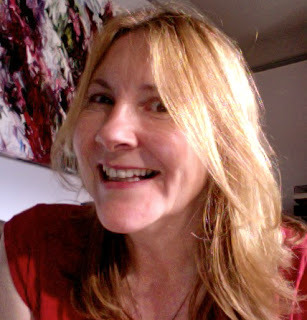 It was a privilege to judge this year’s I Must Be Off! competition, and I’d like to congratulate everybody who made it onto the long and shortlists. Every one of the final nineteen writers deserved their place, and there wasn’t a single piece that could be cast aside with an immediate ’no’.I’m currently reading Silverland by Dervla Murphy, one of my favourite travel writers. It’s a perfect mix of sparse, lyrical description of the Siberian landscape, Russian history, Murphy's own take on the world, and her interaction with the vast and disparate array of people she encounters on her journey. And those encounters, for me, are the most captivating parts of the book. I find myself reading faster, skipping some of the less interesting history, as I anticipate her next human story.For a travel piece to work for me there has to be a human connection, or a meaningful interaction with nature. There are some beautiful descriptive pieces on the shortlist, yet a few are missing that interaction, or don’t have a strong story, and this is the reason they didn’t make the final five. There doesn’t need to be a tale of derring-do or fast action for a piece to be successful, however there does need to be a story of some kind. A few didn’t reach the last five simply because one cliché too many or a weak final sentence can be the difference between getting there and not making it when it’s a close race. In a short piece of writing every word counts, so it’s worth thinking a little harder to find an original adjective. The sea should never be azure, markets should never be bustling, and buildings should never nestle.I was in no doubt about my winner after the first read-through, however choosing the other four was difficult - so difficult that there are half a dozen pieces I’d like to mention in addition to the finalists! I really enjoyed the elegantly written and enchanting story of The Dream Palace, and the Untitled letter, which is beautifully drawn yet feels a little more like memoir than travel writing. I felt the same about So Much New York!, which is a great piece of memoir writing, engaging, witty and entertaining. I love the phrase that sums it up - ‘tourists in each other’s lives.’ The writer of India Looks Like uses stream of consciousness to great effect in conveying the country’s relentless, overwhelming bombardment of the senses.Two pieces that just missed the final five were Long in the Devil’s Tooth and Making a Whip out of Poo in Romania. Long in the Devil’s Tooth is an entertaining whirlwind, a great story written in a captivating and charming style. It just feels a little cluttered as it stands - the final sentence, for example, feels superfluous - yet with another edit it could be honed to perfection. Making a Whip out of Poo in Romania - what a fabulous title! This is another evocative piece, and I felt as though I was there in the snowy Carpathians, which is how it should be. The opening paragraph is strong, and the second half of the piece - the conversation on the train between the narrator and the wonderfully drawn Elena - is well-paced and works well. However, I feel the first half is a little clunky in places and needs a few tweaks.The three commended pieces I’ve chosen are A Fighter in the Waste, Beyond the Reef, and A Peaceful Warzone. I really enjoyed Beyond the Reef, with its vivid and colourful description of South Pacific ocean life. However, I feel there’s an opportunity to elevate this piece further by making more use of the tension created by the appearance of the shark. As the saying goes, start with something interesting, not necessarily what happened first. A Fighter in the Waste is the story of Marcos, a boy in a Nicaraguan orphanage, who has come from La Chureca, Central America’s largest garbage dump. The description of the dump is relentlessly grim, assaulting all the senses, yet even here there is a flicker of hope - there is still Latino pride, and the children have clean clothes. Another moving piece, filled with poignant detail.A Peaceful Warzone achieves a satisfying balance between the human story, the description of war torn Aleppo, the frisson of tension, and the narrator’s own experience. That said, it felt a little as though I was being kept at arm’s length - although I appreciate that’s in keeping with the central theme of facade and outward appearances.The piece I’ve chosen as runner-up, Not Your Mother’s Travel Porn, certainly didn’t keep me at arm’s length. It sweeps you up, deposits you in Africa, and then makes you question the differences and similarities between us that are perhaps not quite what we thought, and the way we see ourselves in contrast to how we are perceived by others. This piece made me think about why we travel, and question which part of what we see is a show and which part is real. What do we ever really know about other people’s lives?Finally, the winner - a piece of writing that moved me to tears, and the story I’m still thinking about long after reading it. My Name is Mai holds nothing back, yet is sensitively written; a bleak, sometimes brutal piece about a street child in Bangkok named Mai who will never be forgotten.The writing isn’t word perfect, and there is the odd typo here and there, but this piece is so evocative and moving that those minor errors are inconsequential. The description of Mai at the beginning of the piece, with her dulled diamond ear studs, is poignantly contrasted with the glittering studs worn by the wealthy Thai student in the closing paragraph. The last sentence, with its double meaning, is perfect, haunting, and will strike a cord with many fellow travellers. The memory of those daily encounters with Mai still resonates down the years for the narrator, and this heartbreaking story will stay inside my head for a long time to come.
It was a privilege to judge this year’s I Must Be Off! competition, and I’d like to congratulate everybody who made it onto the long and shortlists. Every one of the final nineteen writers deserved their place, and there wasn’t a single piece that could be cast aside with an immediate ’no’.I’m currently reading Silverland by Dervla Murphy, one of my favourite travel writers. It’s a perfect mix of sparse, lyrical description of the Siberian landscape, Russian history, Murphy's own take on the world, and her interaction with the vast and disparate array of people she encounters on her journey. And those encounters, for me, are the most captivating parts of the book. I find myself reading faster, skipping some of the less interesting history, as I anticipate her next human story.For a travel piece to work for me there has to be a human connection, or a meaningful interaction with nature. There are some beautiful descriptive pieces on the shortlist, yet a few are missing that interaction, or don’t have a strong story, and this is the reason they didn’t make the final five. There doesn’t need to be a tale of derring-do or fast action for a piece to be successful, however there does need to be a story of some kind. A few didn’t reach the last five simply because one cliché too many or a weak final sentence can be the difference between getting there and not making it when it’s a close race. In a short piece of writing every word counts, so it’s worth thinking a little harder to find an original adjective. The sea should never be azure, markets should never be bustling, and buildings should never nestle.I was in no doubt about my winner after the first read-through, however choosing the other four was difficult - so difficult that there are half a dozen pieces I’d like to mention in addition to the finalists! I really enjoyed the elegantly written and enchanting story of The Dream Palace, and the Untitled letter, which is beautifully drawn yet feels a little more like memoir than travel writing. I felt the same about So Much New York!, which is a great piece of memoir writing, engaging, witty and entertaining. I love the phrase that sums it up - ‘tourists in each other’s lives.’ The writer of India Looks Like uses stream of consciousness to great effect in conveying the country’s relentless, overwhelming bombardment of the senses.Two pieces that just missed the final five were Long in the Devil’s Tooth and Making a Whip out of Poo in Romania. Long in the Devil’s Tooth is an entertaining whirlwind, a great story written in a captivating and charming style. It just feels a little cluttered as it stands - the final sentence, for example, feels superfluous - yet with another edit it could be honed to perfection. Making a Whip out of Poo in Romania - what a fabulous title! This is another evocative piece, and I felt as though I was there in the snowy Carpathians, which is how it should be. The opening paragraph is strong, and the second half of the piece - the conversation on the train between the narrator and the wonderfully drawn Elena - is well-paced and works well. However, I feel the first half is a little clunky in places and needs a few tweaks.The three commended pieces I’ve chosen are A Fighter in the Waste, Beyond the Reef, and A Peaceful Warzone. I really enjoyed Beyond the Reef, with its vivid and colourful description of South Pacific ocean life. However, I feel there’s an opportunity to elevate this piece further by making more use of the tension created by the appearance of the shark. As the saying goes, start with something interesting, not necessarily what happened first. A Fighter in the Waste is the story of Marcos, a boy in a Nicaraguan orphanage, who has come from La Chureca, Central America’s largest garbage dump. The description of the dump is relentlessly grim, assaulting all the senses, yet even here there is a flicker of hope - there is still Latino pride, and the children have clean clothes. Another moving piece, filled with poignant detail.A Peaceful Warzone achieves a satisfying balance between the human story, the description of war torn Aleppo, the frisson of tension, and the narrator’s own experience. That said, it felt a little as though I was being kept at arm’s length - although I appreciate that’s in keeping with the central theme of facade and outward appearances.The piece I’ve chosen as runner-up, Not Your Mother’s Travel Porn, certainly didn’t keep me at arm’s length. It sweeps you up, deposits you in Africa, and then makes you question the differences and similarities between us that are perhaps not quite what we thought, and the way we see ourselves in contrast to how we are perceived by others. This piece made me think about why we travel, and question which part of what we see is a show and which part is real. What do we ever really know about other people’s lives?Finally, the winner - a piece of writing that moved me to tears, and the story I’m still thinking about long after reading it. My Name is Mai holds nothing back, yet is sensitively written; a bleak, sometimes brutal piece about a street child in Bangkok named Mai who will never be forgotten.The writing isn’t word perfect, and there is the odd typo here and there, but this piece is so evocative and moving that those minor errors are inconsequential. The description of Mai at the beginning of the piece, with her dulled diamond ear studs, is poignantly contrasted with the glittering studs worn by the wealthy Thai student in the closing paragraph. The last sentence, with its double meaning, is perfect, haunting, and will strike a cord with many fellow travellers. The memory of those daily encounters with Mai still resonates down the years for the narrator, and this heartbreaking story will stay inside my head for a long time to come.
Published on October 08, 2018 15:30
October 2, 2018
My Name is Mai by J L Hall
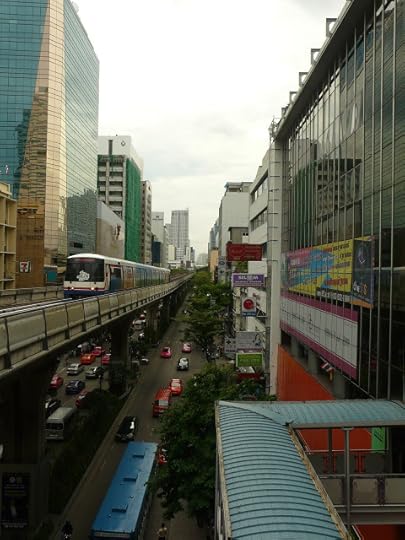 Every time I climb the stairs to the Skywalk, I look for her. For Mai, small and filthy in her yellow dress. She sits here against a pillar, baht scattered and glinting around her, a tattered cardboard sign propped in her lap etched in marker pen that says: My Name Is Mai.
Every time I climb the stairs to the Skywalk, I look for her. For Mai, small and filthy in her yellow dress. She sits here against a pillar, baht scattered and glinting around her, a tattered cardboard sign propped in her lap etched in marker pen that says: My Name Is Mai.I think she is three or four, tiny for her age. Her fingers and soles are dark with the ingrained dirt of a beggar. Her dress is full of Bangkok’s dust and stink, its edges are blackened, as are the gold bracelets on her wrists and ankles. The diamond earrings that stud her ears are dulled. Here, in the broiling heat, suspended between the heavens and the thunder of the traffic below, she sits motionless and mute. Her eyes are dead.
Every time I climb the stairs I crane my neck to see who has left her. Are they here, watching? Is there a gang or only a pimp? She is dark skinned; has she been trafficked from the rural north, Cambodia or Myanmar? How long before I arrived did they deposit her, prop her against the pillar and steal away, creeping down the stairs to melt into the throng and leave this toddler, who I have never seen move or speak, alone without protection.
I come every day along the Skywalk. I tell myself that this is the best route from the city to National Stadium station where I return home to my guesthouse. My palm is hot with the baht that I clutch in it, in the evenings my fingers smell of brass. I drop the coins in front of Mai, resisting the urge to crouch and touch her, to pull her to me, to scoop her into my arms and to run, to speed her away from this fucking existence, this fate worse than death. Instead, I hover, I drop my change with a tinkle onto the concrete and pause, waiting for her to glance up. To connect, to give her human warmth. To show her love. But she never does. Sometimes I leave water and titbits of food, but I worry that it is worse for her, that she might be punished.
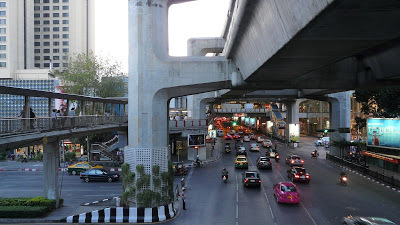 The Skywalk heaves with shoppers and commuters, school children and backpackers. Women clasping pastel-coloured plastic bags of market vegetables. Office workers eating moo ping from the hawkers in the street below and whose aroma coils up above the traffic fumes. If you stop for a moment you feel the vibration: the footfall, the traffic, and at points the roar of the Skytrain overhead as it hurtles from station to station. The floor shakes, just slightly, but constantly. In the middle of this maelstrom sits Mai, small and unseen.
The Skywalk heaves with shoppers and commuters, school children and backpackers. Women clasping pastel-coloured plastic bags of market vegetables. Office workers eating moo ping from the hawkers in the street below and whose aroma coils up above the traffic fumes. If you stop for a moment you feel the vibration: the footfall, the traffic, and at points the roar of the Skytrain overhead as it hurtles from station to station. The floor shakes, just slightly, but constantly. In the middle of this maelstrom sits Mai, small and unseen.*
It is now May. Bangkok is febrile with political protests and bloodshed. The sky is stained yellow from teargas and black from smoke: the city burns in the streets where the battles between red-shirts and the army are fought. The heat builds, mercury rising with the conflict, and now the surreal mania of Songkran, Thailand’s New Year and water festival. Amid the terror, Thai teenagers fire day-glo water pistols at one another and drench pedestrians with buckets of water for sanook, for fun.
One day I pass along the Skywalk with coins pressed in my hand to find that Mai is not here. I halt, confused, before retracing my steps: I must have passed her, perhaps she was hidden by the crowd. Perhaps I haven’t reached her yet, perhaps she has been moved. I pace back and forth between Chit Lom and National Stadium stations: she is gone. So I wait. I loiter, toe-ing my flip-flops on the concrete, my back slick with sweat as I lean on the railing. Mai doesn’t appear. I begin to wonder if I am being watched, if her pimp won’t leave her here; maybe I have been spotted before. Perhaps, like other do-gooding Westerners before me, there is a risk I might interfere, or pointlessly call the police. After a while I give up and return home in the fading light to my guesthouse where I think about her as I lie in bed and wonder where she sleeps, if she has a bed, if she has food, if she has anyone who is ever kind to her. If in her wretched life she is ever, ever safe.
 from the BBCI don’t see Mai again. I leave for London not long after this; Bangkok is increasingly violent, and news reports of murdered journalists and injured civilians are reaching concerned family and friends in Britain. There are rumours of impending airport occupations and road blockages. I flee the country like all travellers eventually do: impotent, guilty, and ultimately selfish.
from the BBCI don’t see Mai again. I leave for London not long after this; Bangkok is increasingly violent, and news reports of murdered journalists and injured civilians are reaching concerned family and friends in Britain. There are rumours of impending airport occupations and road blockages. I flee the country like all travellers eventually do: impotent, guilty, and ultimately selfish.*
I think of Mai today, some ten years later as I sit with a student in her final tutorial and notice the smallness of her hands, they are almost miniature. I stare at them as she is talking and gesticulating, asking me questions that I no longer hear. Mai will be a teenager now, if she has lived. She will have been prostituted and raped and perhaps sold and trafficked out of Thailand. Perhaps she has ended up in prison, with her veins full of needle-sticks and heroin. If she is lucky, she will be painted and gaudy in the neon sois of Patpong with the other bar-girls and pimps where she retreats up dingy stairs to be groped and penetrated by Westerners whose baht lie scattered and glinting around her. This would be a fate better than a fate worse than death.
My student is from Thailand, from a wealthy family. She will shortly return there to work in her parents’ jewellery business and study gemology. She tucks a strand of hair behind her ear and her diamond studs glitter. She wishes me well and thanks me for her help, for the difference I made.
“I did nothing,” I say._______________________________________
 J L Hall is a Scottish writer and lecturer working on her second novel. Since 2016, her first two novels have been finalists in several UK writing awards. Her essays and short-fiction have been published online and included in anthologies. In 2009, she completed a solo round-the-world trip.
J L Hall is a Scottish writer and lecturer working on her second novel. Since 2016, her first two novels have been finalists in several UK writing awards. Her essays and short-fiction have been published online and included in anthologies. In 2009, she completed a solo round-the-world trip.
Published on October 02, 2018 06:30
September 25, 2018
Not Your Mother’s Travel Porn by Douglas Weissman
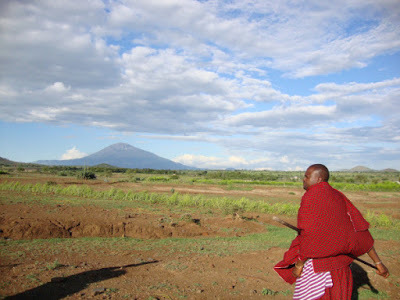 We came to the boma, a gate that encircled the village beneath the shadows of the distant mountains. Outside the main streets of Arusha, hidden in the brush and discarded trash that bordered some semblance of harvested gardens, we followed our Maasai guide as he toured us through the local village. The sunlight in the Tanzanian air was hot and humid; the shade in Tanzania was also hot and humid. I traveled with a group brought together by a ramshackle truck taking us from Dar es Salaam to Nairobi.
We came to the boma, a gate that encircled the village beneath the shadows of the distant mountains. Outside the main streets of Arusha, hidden in the brush and discarded trash that bordered some semblance of harvested gardens, we followed our Maasai guide as he toured us through the local village. The sunlight in the Tanzanian air was hot and humid; the shade in Tanzania was also hot and humid. I traveled with a group brought together by a ramshackle truck taking us from Dar es Salaam to Nairobi.The closer we came to the boma, the closer we came to the shouts of children, another step in and out of the shadows, another loud collection of screams. Straps wrapped around pieces of the gate holding newer strips of wood together against aged and warped stakes. The men of the village would soon replace the entire fence needed to keep the goats penned in. Our guide was wrapped in a vibrant red and black plaid Shúkà, a collection of traditional wraps. It wasn’t hard to figure out the children’s words, even though we hadn’t understood them from the distance.
Mzungu! Mzungu! they said. It was a word I had become accustomed to over the months traveling through East Africa. The term is said to have originated in the 19thcentury from the confused look of navigationally challenged Europeans, meaning, “aimless wanderers,” and has since become directed at foreigners, most noticeably, white people. The children ran out from behind the open gate, grabbed our hands, and steered us into the village, as if we were the lost children in desperate need of guidance.
The village was a spread of mud huts and open space with a small pen inside the bordering gates holding the goats. It was a village built by the women, maintained by the women, and, once upon a time, packed up and moved to follow the cattle, ever in chase of rain and endless plains. Sometimes a place can be filled with the inelegant difference that makes me wonder why I have come this far in the first place, but within the coarseness is something akin to wonder, based on something like truth.
The mass of children were half-brothers and half-sisters, born of a single father to different mothers; the Maasai traditionally, and continues to be, a polygamous culture. Looking out over the village was different than staring out of an open roof at rhinoceros and lions. Lions laze in the grass twenty hours a day, their golden fur heavy and hot in the African sun. At that moment, we felt more like a herd of goats in a petting zoo, gawked at and fondled by the children of the village.
Days before, I had sat in a jeep watching two male lions rest in the thick grass of Ngorongoro Crater. One lion had a wound on its left flank, an open gash where bits of red glowed within tiny gaps of the fly-swarm that fed on, or laid eggs in, whatever nutritious grime and crust they found inside the wound. Related male lions without a pride stick together—safety in numbers, and everyone knows safety never takes a vacation.
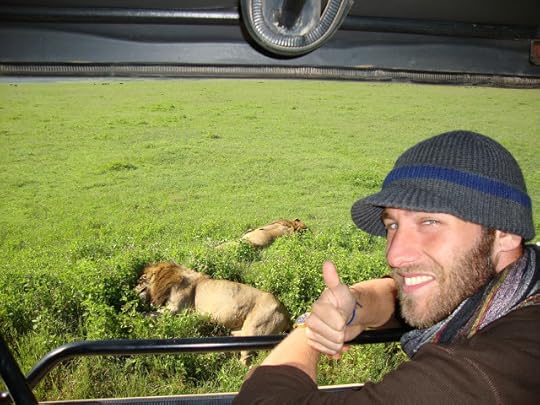
I stretched my arms outside of the window for a glorified selfie with the lazy wild, animal kings. Whether because of my time spent in Africa up to that point, or due to the lack of thought at all, the moment didn’t seem real; it definitely did not seem like the right thing to do.
The walk to the village hadn’t changed my perspective on life but something about having my hand held by a random child—where other children in other villages I had visited, from Zimbabwe to Malawi, had climbed onto my back, head, and shoulders—that was serene, filled with a series of breaths, where present awareness became as important as the moment itself. I was there specifically because it was different, and that the cries of the children were aimed at me because everything about me was different to them. They had crossed the boma and pulled me inside.
The children stood in line and sang songs they learned in school. Their voices were soft and shy, each child as timid as the next, like a chorus draped in faded pastels. When their singing subsided, they showed us their dance moves, including, what became, the quintessential sway of one of the girl’s hips, hand on her head with her elbow out, shifting her weight to the beat.
Then the Mzungus, of whom I was a part, sang the songs we knew, danced the dances we knew, showed the children that we also like to dance and sing, that we like foolishness in our lives that sometimes don’t seem foolish enough. But we would never know if silliness existed after we left or would the children then work the field, tend the goats, or marry a wealthy Maasai man from four villages over.
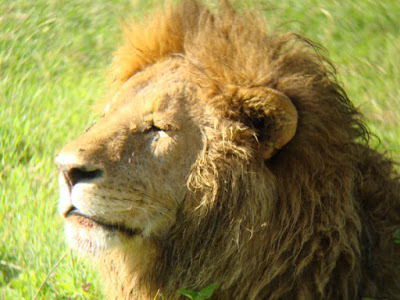
Beyond the stellar palaces guidebooks recommend or where lions laze in the savannah for long enough to turn from inspiring to--dare I say--boring, the real world returns for a radiant second. Within those backstreets and back-alleys, hidden along the trash-heaped paths that lead to a village inside a wooden fence, I saw the thin line separating maturity and immaturity, childhood and adulthood.
The oldest girl in the group hid a wide piano key smile behind her hand as the Mzungus danced. She was thin but not frail, shy but not afraid, wearing a shirt with a cartoon character printed on the front. I stepped to the side of the group to take a photo with her. I stretched out the camera and leaned in. I knew my face would fill the screen. I looked back with my smile, my finger ready to snap the pic, ready to tell her to laugh. Instead, she ran away.
And then I saw myself for what I was to those children—to that girl. ___________________________________
 Douglas Weissman is a graduate of the Master of Fine Arts program in Creative Writing at the University of San Francisco. His short stories have been published in 3 Elements Review and Soft Cartel. He works as a travel writer and lives in Los Angeles.
Douglas Weissman is a graduate of the Master of Fine Arts program in Creative Writing at the University of San Francisco. His short stories have been published in 3 Elements Review and Soft Cartel. He works as a travel writer and lives in Los Angeles.
Published on September 25, 2018 06:30
September 18, 2018
A Fighter in the Waste by Nolan Janssens
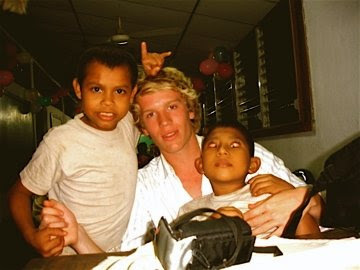 Tossing dead scorpions to chickens, slicing through a tangle of thorny scrub with a machete, and shitting in a dirt hole has become our daily routine. The cattle-pen that we had volunteered to build is almost complete. Our goal is to help an orphanage near Chinandega (Nicaragua) become self-sustainable, but we haven’t yet spent time with the kids we are hoping to help.
Tossing dead scorpions to chickens, slicing through a tangle of thorny scrub with a machete, and shitting in a dirt hole has become our daily routine. The cattle-pen that we had volunteered to build is almost complete. Our goal is to help an orphanage near Chinandega (Nicaragua) become self-sustainable, but we haven’t yet spent time with the kids we are hoping to help.Until today.
A couple dozen kids spill out of a rusted bus. On one side of the bus, I notice graffiti of a snake weaving its way through a simplified map of Central America. The letters CIA decorate the scales of the cartoonish snake. The owner of the orphanage explains that President Reagan allowed the CIA to carry out covert plans to help the Contras defeat the Sandinista government—a democratic socialist government. Cocaine. Soviets. Warfare. Issues too complicated for today. Today is about the future. Today is about the kids. Together we snack on Gallo Pinto, and Nacatamal, a corn dough that, here, was always prepared with lard to guarantee sustenance throughout the day. The children look into our eyes with confidence and respect that, from my experience, is rare with many kids in the first world. Their gestures are grand, and their warmth is contagious. Most of them laugh and play. Most show-off the little English they know. Most don’t seem angry at an unjust world.
All except Marcos.
The other kids avoid him, and I notice him stare. His eyes: big, round, and fierce with a pain I will never understand. The owners of the orphanage warned us about Marcos. A boy that came to the orphanage from La Chureca, the largest garbage dump in Central America. When the owners of the orphanage found him, he was suffering from malnutrition and kwashiorkor; his belly looked stretched and empty like a balloon. And now that he’s healthy, he wants to do nothing other than to flex his newfound muscles and wrestle.
I let him use me as a punching bag, and we wrestle like two outcasts that just want to be held. The owner approaches and tells me that Marcos is on his last warning for violent behaviour. One more violent act and he will get kicked out of the orphanage. To distract him from fighting, I let him listen to my iPod mini. Music can heal, I think. I hope.
“No me gusta esto ¿Tienes buena música?” Marcos asks.
“¿Quieres música Española?” I ask.
“Si.”
He skips through the songs until he finds the gangster rap song, "Jefe", by Daddy Yankee and asks me to turn it up. With the earbuds in, he shouts out the chorus, revealing his anger and pain. Then suddenly he hugs me, his anger gone. At that moment, we become friends, and I am transported back to La Chureca, wanting nothing more than this boy never to return there.
***
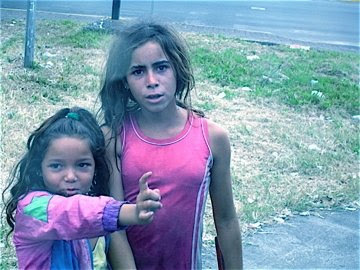 Just weeks earlier our introduction to Nicaragua had included a drive past La Chureca on our way to the farm. La Chureca is home to hundreds of families, and half the people here are children. Over a third of the people were piercing the never-ending garbage with homemade spears, looking for recyclables that they could later sell. Others dug through food scraps that the nearby restaurants dumped. The other option for food would be the fish in Lake Managua. A lake that the city uses as domestic and industrial wastewater. And there we sat in our bus, safe and satiated from our morning hotel breakfast.
Just weeks earlier our introduction to Nicaragua had included a drive past La Chureca on our way to the farm. La Chureca is home to hundreds of families, and half the people here are children. Over a third of the people were piercing the never-ending garbage with homemade spears, looking for recyclables that they could later sell. Others dug through food scraps that the nearby restaurants dumped. The other option for food would be the fish in Lake Managua. A lake that the city uses as domestic and industrial wastewater. And there we sat in our bus, safe and satiated from our morning hotel breakfast.My full stomach turned with the thick stench of piss, decay, and the chemical odour of shoe glue that filled the bus. There were dozens of vultures, some of which seemed to stare at a young girl that wore a surprisingly clean white button-up shirt and backpack. I scanned the dump, and among the emaciated cattle and dogs that lay around the rotting garbage, I noticed a few women washing clothes on a rippled piece of hard plastic. Even here, amidst some of the most gruelling poverty in the world, Latino pride didn’t die. The shack next to the women had a mural of Anastasio Somoza Debayle, the de facto ruler of the country from 1967 to 1979, painted with the teeth of a vampire. Spray-painted words leaked down the mural like stained droplets of blood. Even though I couldn’t decipher the words, I knew they represented the blood Somoza bought and sucked out from his people for cheap to later sell to the United States and Europe.
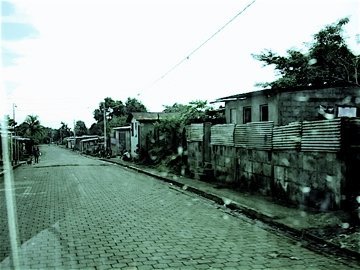
There we sat, safe, peering out our windows as though La Chureca was a tourist attraction. Most of the people outside ignored us as they focused on their labour. Some adults glanced up at us, their eyes blood red and defeated. Unlike the children, their fighting spirit seemed to be dwindling and trampled on by decades of corruption and greed. All that seemed to be left was their physical drive for survival.
Their eyes looked nothing like Marcos’.
At the time, I wasn’t yet thinking about my friend and his hardened glance that liquified when we sang and danced and wrestled. At the time, I didn’t know that my friend would return here.
Should I have left my iPod and music with Marcos? Could I have taught him to channel his anger? These were questions I didn’t know yet to ask.
__________________________________
 Nolan Janssens was born in Santiago, Chile; took his first steps in Antwerp, Belgium, and grew up in British Columbia, Canada. He was born without borders; thinking outside the box is part of his make-up. Nolan often subverts and challenges the status quo with humour, metaphor, and an eclectic mix of narratives.
Nolan Janssens was born in Santiago, Chile; took his first steps in Antwerp, Belgium, and grew up in British Columbia, Canada. He was born without borders; thinking outside the box is part of his make-up. Nolan often subverts and challenges the status quo with humour, metaphor, and an eclectic mix of narratives.
Published on September 18, 2018 06:30
September 11, 2018
A Peaceful Warzone by Hannah Elkak
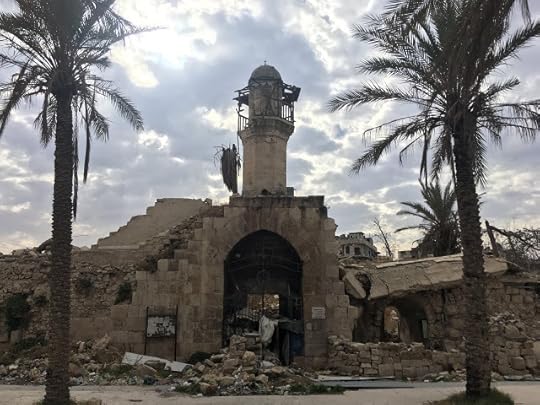 During the first 12 hours in Aleppo, we hadn’t seen any war. It was almost as if everything we had seen on TV and the harrowing pictures splashed on front pages were a fabrication. On the street outside the flat, Wissam’s uncle and I waited in his car whilst Wissam ran back home to collect his passport. While we waited for him to come back, I asked if we would need our passports on us at all times during the trip. He responded, “not if you’re with me.”
During the first 12 hours in Aleppo, we hadn’t seen any war. It was almost as if everything we had seen on TV and the harrowing pictures splashed on front pages were a fabrication. On the street outside the flat, Wissam’s uncle and I waited in his car whilst Wissam ran back home to collect his passport. While we waited for him to come back, I asked if we would need our passports on us at all times during the trip. He responded, “not if you’re with me.”For the journey to the Citadel, I sat in the front of the car so that I would have the best view of the city. The wide streets that we drove down were not dissimilar from those in any European city. Already, I preferred Aleppo to Beirut because of the sense of familiarity it gave me. However, as the streets narrowed into Old Aleppo, all familiarity disappeared. It was then that the vast and devastating extent of the destruction became obvious.
Houses, businesses, places of worship -- nothing had been left untouched. At the side of the road, a team of builders were working on the restoration of a bombed-out mosque. The stone had been reclaimed from the wreckage and cleaned and would be used in an attempt to re-establish Aleppo’s identity as a place of rich heritage. They were working to make the place brand new but old again.
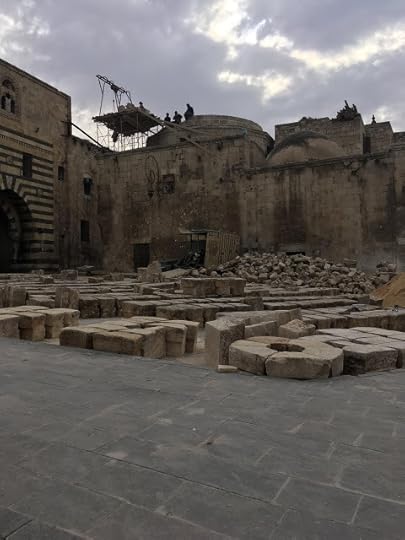 As we drove further in, I rolled down my window and pulled out my phone to take photographs. A soldier came towards us in protest of my getting snap happy. “Fair enough,” I thought as I questioned my own humanity. What kind of tourist takes pictures of a war zone? Now, though, the emotion that is lost between my notes and my memories is captured in every little pixel of the photographs I took. Looking back is the only thing that can truly take me back to that time and that place.
As we drove further in, I rolled down my window and pulled out my phone to take photographs. A soldier came towards us in protest of my getting snap happy. “Fair enough,” I thought as I questioned my own humanity. What kind of tourist takes pictures of a war zone? Now, though, the emotion that is lost between my notes and my memories is captured in every little pixel of the photographs I took. Looking back is the only thing that can truly take me back to that time and that place. Round the next corner and along a cobbled street was the Citadel. All around us, buildings had been bombed to the ground. Turned from grandeur to rubble was the Carlton hotel, which had stood inexorably grand even in the shadow of the Citadel. It was the only building that had been entirely destroyed, because it had been blown up from inside underground tunnels. Whilst the other buildings had become skeletal – you could make out what they should have been, but whatever had given them life was now missing – the Carlton hotel was indistinguishable amongst the rocks and rubble.
The Citadel is grand and imposing. It was, for the most part, untouched by the war. Although the rebels had surrounded it, only the regime and its allies had the means for airstrikes and they weren’t about to bomb their own castle. The Citadel is closed to the public, but Wissam’s uncle is well-connected and made a few calls to see if he could get us in.
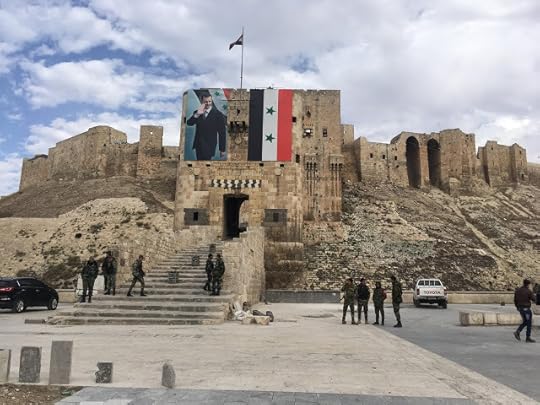
While we waited, I wandered over to what used to be a mosque. Wissam followed me over and we decided to go in. It was no longer a sacred place, but a shell. The rebels had used this as a place to house snipers during the height of the civil war. Stones had been rearranged to make uncomfortable beds and a labyrinth of rooms. The main room looked out directly to the castle. A perfect spot for any shooter. The human excrement further into the destroyed building suggested that this place was a far cry from being abandoned. There was nobody there, but there had been -- and recently.
A shout from the distance confirmed that we would be going up into the Citadel. The word citadel means ‘little city.’ I didn’t know that before we went, but that’s exactly what it was. With old baths, a royal hall and an amphitheatre, it didn’t take much imagination to transport back to a time when this place would have been alive. Graffiti on the walls left by school kids on a boring excursion was a stark reminder that the people here had been, and are, just like us.
I’d been walking alone for a while, and when I turned around Wissam was nowhere to be found. Tracing my steps back, I found him chatting to Hassan, one of the soldiers on duty. “What are you talking about?” I’d asked. As Wissam started to tell me, Hassan hurriedly shushed him: “please don’t tell her anything!” Outsiders are not unwelcome, but their questions are.
What Hassan had told Wissam was that during the war the Syrian Army had been largely unprepared and under-manned. More soldiers were needed elsewhere, so a team of fewer than 50 had been responsible for securing the Citadel. They had worked tirelessly night and day to create formations that looked far larger than they actually were. A quick survey of the people we knew told us that the trick had worked; in the worst days of the war, to outsiders, it had looked like there were upwards of 1000 soldiers protecting the castle.
This trait is not unique to Arabs, but it I have found it especially prominent in my time in the Arab world. They are masters of creating façades; I once worked in a university whose massive marble library had spiral staircases and large fountains, but not a single book. Outward appearances are everything to Arabs; this is what you are judged on. So many times, I have met friends and family members of my husband who have told me, “you look prettier in real life,” “your lips are very thin, do you know there’s a surgery for that?” and – my personal favourite – “you’ve lost weight, you were much fatter on your wedding day.” This obsession with the aesthetic, however frivolous it may seem, could just have been the very thing that saved the Citadel from what can only be described as the lunatic rebels.
_______________________________
Hannah Elkak is a teacher and aspiring writer from the UK, living in Riyadh, Saudi Arabia. Hannah dreams of life away from the desert, breathing fresh air and going for long walks. After spending six years in the Middle East, she has a lot to write about it.
Published on September 11, 2018 06:30



